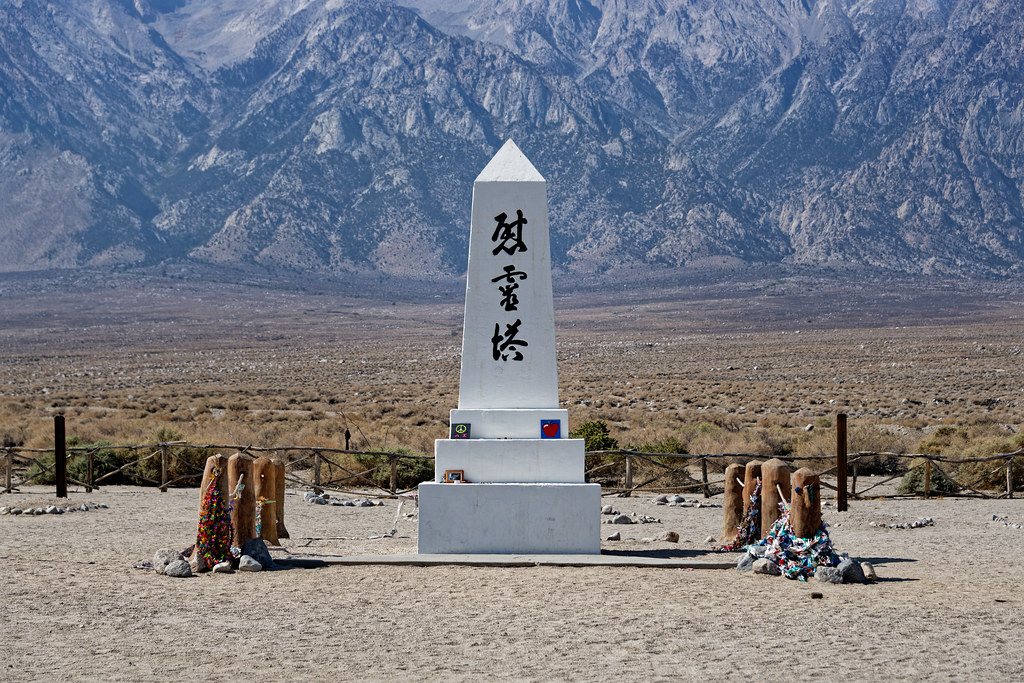#Japanese incarceration
Explore tagged Tumblr posts
Text
I was today years old when I learned that Canada also incarcerated Japanese immigrants and Japanese Canadians during World War II.
I knew America had concentration camps for people of Japanese ancestry, but I had never been told by anyone that Canada did too. I only figured it out now because the Wikipedia article on the American camps had a link to the page on Canada's.
Seems like something that should be talked about more often. I hate how America centric even our world history classes are.
#history#american history#canadian history#canadian#japanese history#japanese#japan#canada#american#america#usa#us history#usa history#japanese american#japanese canadian#concentration camp#japanese internment#internment camp#japanese incarceration#mass incarceration#world history#ww2 history#ww2#wwii#wwii history#world war 2#world war ii#wwii era
12 notes
·
View notes
Text
no but ryo paul debut is actually making me care about paul as a character for the first time because holy fuck if a white darry & japanese american paul dynamic is not supremely compelling in terms of 1960s oklahoma race and class tensions
#the casting of the soc boys in terms of race is sooo deeply interesting to me#especially with what henry said in one of emma’s vlogs about like when he plays a greaser his character is allowed to show his latino side#through little costume details and such#but when he plays a soc the character is very much white-passing#and like there are very clearly and intentionally no black actors playing socs#so paul being visibly japanese american is SO fucking interesting#both in terms of like the myth of the model minority and also like#the idea of this japanese american kid from a successful family 20ish years out from world war ii#his parents were almost certainly incarcerated during the war#something about an american dream narrative#someone talk to me about this#the outsiders#the outsiders musical#the outsiders broadway#outsiders musical#paul holden#ryo kamibayashi
67 notes
·
View notes
Text
OK So Context
I kind of progressively lost my mind in college. What with the learning about the specifics of what is going on and how it relates to what has happened in the past. -and subsequently took the time to develop a series of presentations about why the US sucks.
Specifically, the interventions in Latin American, just the astoundingly predatory nature of American Capitalism domestically and The Police, like, as a concept.
Fast forward to the Summer of 2022 and I realized that working with an editor and publishing a book is hard and expensive but its measured in thousands not tens of thousands so I committed to doing that at some point in my life with this project, and began working on adapting the presentations with more research and more connections between these different expressions of White Supremacy.
I let the research balloon. There's just so much.
Anyway, the whole social media campaign thing was to distract me from pinning all that down. -and last month one of the members of my subreddit, u/acebush1, self immolated in the time it took to get around to responding to his most recent comment. That made this all very real. The US' support for Israel and it's foundation as a settler colonial state are critically relevant.
Right, so,. Last month someone asked me how to buy the book and that was the thing I had said to myself would mark the transition back to a writing and research focus rather than just research and learning social media.
Site is up. Its an email submission form with a set your own price stripe link.
#US Authoritarianism Project#Aaron Bushnell#US Politics#protest#writeblr#History#Colonialism#Imperialism#Police#Duopoly#Democracy#republicans#American Fascism#american exceptionalism#Slavery#Jim Crow#Segregation#Mass Incarceration#reservation#deportation#forced migration#sterilization#eugenics#ethnic cleansing#dred scott#japanese internment#guantanamo#trail of tears#US Authoritarianism#Anarchy
16 notes
·
View notes
Text
a brief history of forced assimilation and language loss in japanese american (nikkei) comumunities
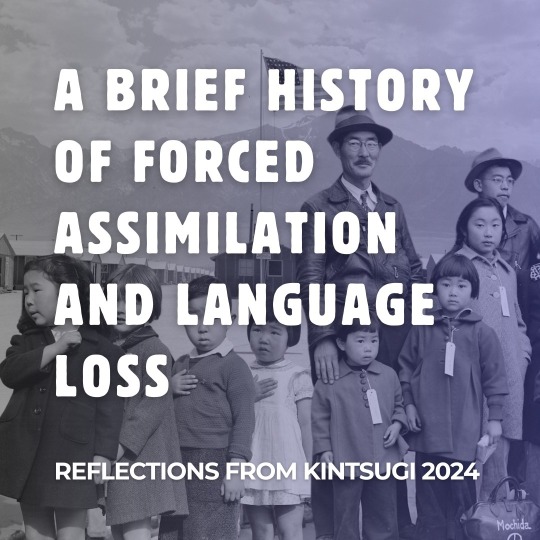
[image description: the words "a brief history of forced assimilation and language loss, reflections from kintsugi 2024" appear over a composited photo of a japanese american man with children all wearing their camp ID tags and children with their hands over their hearts as if reciting the pledge of allegiance. the background is the camp barracks with an american flag flying in front.)
kintsugi 2024 was a conference for nikkei folks to talk about generational trauma and repair. denshō, the organization that archives our history related to the ww2 incarceration, released this series of infographics on their instagram page (shared with permission).
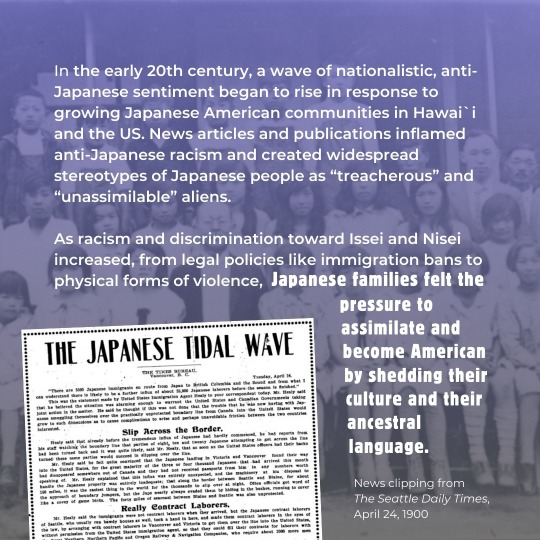
[image description: text reads, "in the early 20th century, a wave of nationalistic, anti-japanese sentiment began to rise in response to growing japanese american communities in hawai'i and the US. news articles and publications inflamed anti-japanese racism and created widespread stereotypes of japanese people as 'treacherous' and 'unassimilable' aliens.
as racism and discrimination toward issei and nisei increased, from legal policies like immigration bans to physical forms of violence, japanese families felt the pressure to assimilate and become american by shedding their culture and their ancestral language."
a news clipping from the seattle daily times april 24, 1900 is included with the headline "the japanese tidal wave." all text appears over a posed group photo of nikkei people from the turn of the 20th century. end ID]
"issei" means first generation, the original immigrants, and "nisei" is the second generation.
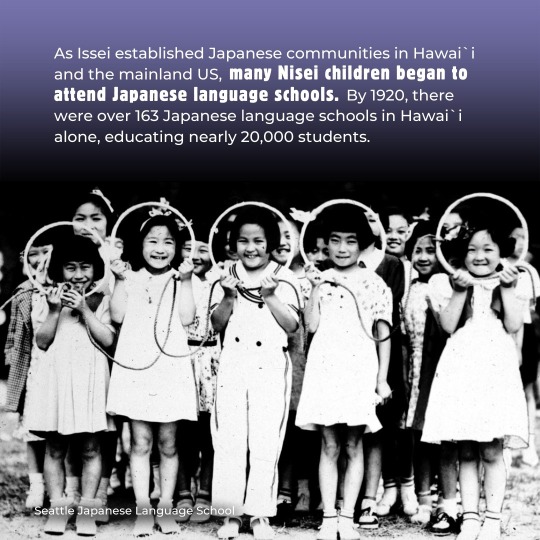
[image description: text reads, "as issei established japanese communities in hawai'i and the mainland US, many nisei children began to attend japanese language schools. by 1920, there over 163 japanese language schools in hawai'i alone, educating nearly 20,000 students."
the text is above a photo of an early 20th century class of the seattle japanese language school, elementary school-aged children smiling and holding up hoops and jump ropes. end ID]
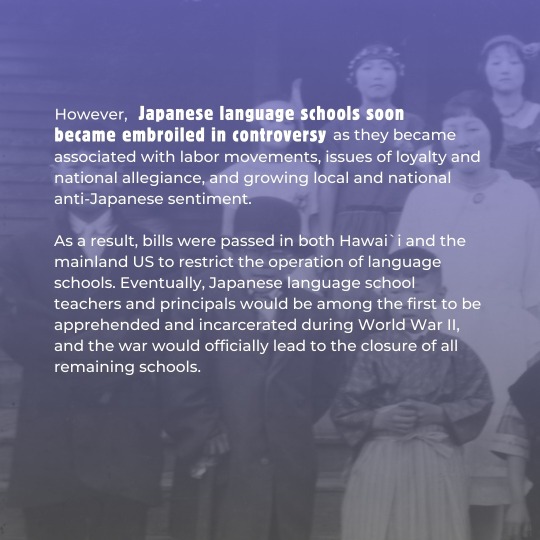
[image description: text reads, "however, japanese language schools soon became embroiled in controversy as they became associated with labor movements, issues of loyalty and national allegiance, and growing local and national anti-japanese sentiment.
as a result, bills were passed in both hawai'i and the mainland US to restrict the operation of language schools. eventually, japanese language school teachers and principals would be among the first to be apprehended and incarcerated during world war 2, and the war would officially lead to the closure of all remaining schools."
text is superimposed over a photo of japanese americans of various ages in 1920's western wear as well as traditional japanese garb. end ID]

[image description: text reads, "the loss of culture and language continued through ww2 incarceration, especially among the younger generations. a key site of forced assimilation and cultural erasure included the camps' WRA-run schools.
these schools enforced american customs and practices, such as mandatory recitation of the pledge of allegiance, and students were prohibited from speaking japanese or learning about japanese history and culture. these WRA-run schools thus contributed to the state's 'americanization' efforts to turn japanese americans into loyal citizens who could eventually be reintegrated into society after the war."
the text appears below a photo depicting incarcerated nikkei children in 18th century colonial american costume holding up a recreation of the original 13-star betsy ross flag. end ID]
WRA is the acronym for the war relocation authority which oversaw the forced removal of nikkei people from so-called 'military exclusion zones,' aka anywhere within 300 miles of the western coast of the US.
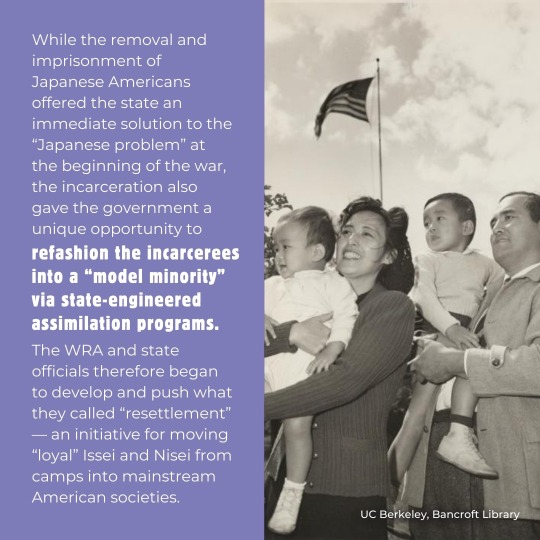
[image description: text reads, "while the removal and imprisonment of japanese americans offered the state an immediate solution the the 'japanese problem' at the beginning of the war, the incarceration gave the government a unique opportunity to refashion the incarcerees into a 'model minority' via state-engineered assimilation programs.
the WRA and state officials therefore began to develop and push what they called 'resettlement' - an initiative for moving 'loyal' issei and nisei from camps into mainstream american societies."
the text appears to the left of a photo of a four person family. the parents wear smiles and hold a toddler in each of their arms while an american flag flies above them in the background. end ID]
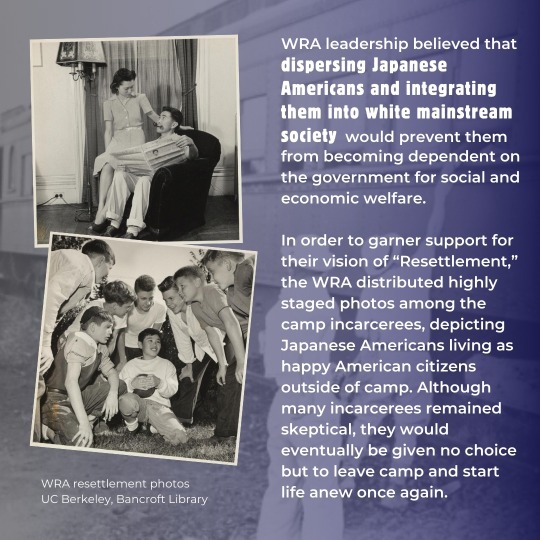
[image description: text reads, "WRA leadership believed that dispersing japanese americans and integrating them into white mainstream society would prevent them from becoming dependent on the government for social and economic welfare.
in order to garner support for their vision of 'resettlement,' the WRA distributed highly staged photos among the camp incarcerees, depicting japanese americans living as happy american citizens outside of camp. although many incarcerees remained skeptical, they would eventually be given no choice but to leave camp and start life anew once again."
the text is superimposed over a photo of two people in white garb shaking hands with someone through a train window. two WRA propoganda photos to the left of the text show a japanese american couple at home, the wife sitting on arm of the husband's easy chair while he reads a newspaper and smokes a pipe, and a japanese american child in the middle of a football huddle with eight other children, all of whom are white. end ID]
many nikkei families were terrified to leave camp following the war knowing that americans saw them as the enemy. the people who were lucky enough to return to the communities they had lived in before the evacuation found anti-japanese signs on their neighbors houses and vandalization of any property that remained to them. my great-grandfather's farmhouse was burned down, confirmed arson. i can't imagine going back there and wondering which of your neighbors did it.
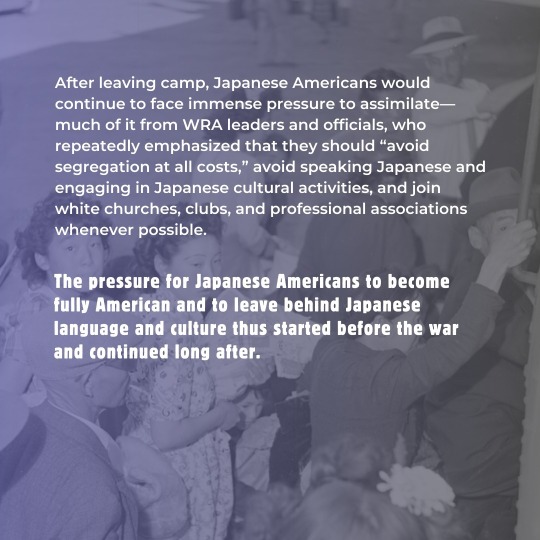
[image description: text reads, "after leaving camp, japanese americans would continue to face immense pressure to assimilate - much of it from WRA leaders and officials, who repeatedly emphasized that they should 'avoid segregation at all costs,' avoid speaking japanese and engaging in japanese cultural activities, and join white churches, clubs, and professional associations whenever possible.
the pressure for japanese americans to become fully american and to leave behind japanese language and culture thus started before the war and continued long after."
the text is superimposed over an image of nikkei people in 1940's western dress boarding a train. end ID]

[image description: text reads, "despite this long hisory of racial discrimination, cultural oppression, and forced assimilation, the past few decades have witnessed a rise of japanese americans seeking to reclaim their culture, language, and history:
-empowering survivors and descendants to tell their stories in oral histories.
-preserving and sharing family history through resources like the denshō digital repository, names registry, denshō encyclopedia, and sites of shame.
-retrieving koseki (family registers), the most important genealogical documents for tracing your ancestry in japan
-community healing and repair led by organizations like tsuru for solidarity and the japanese bilingual bicultural program."
text is superimposed over an image of nikkei protestors in the 1980's campaigning for the redress movement, a national coalition of survivors and descendants of the incarceration camps. end ID]
these are some of the specifics related to nikkei assimilation, but it's important to note that this happens to varying degrees to all ethnicities under the american colonial project.
#actually nikkei#japanese american history#japanese american incarceration#assimilation and language loss#日系#日系人
5 notes
·
View notes
Text

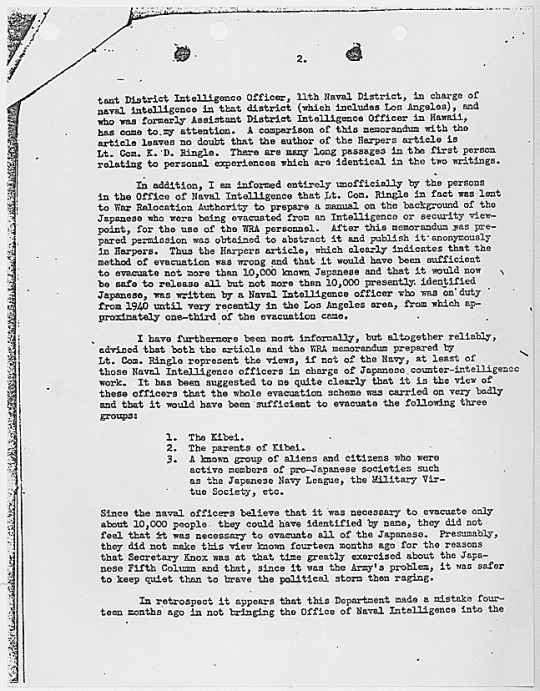

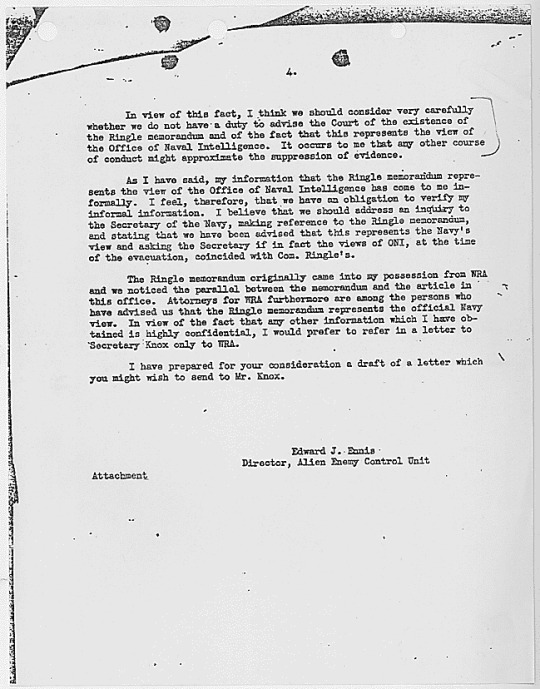
At the beginning of WWII, Naval Intelligence officers concluded that there were around 10,000 Japanese Americans who could pose a threat to the U.S.
Army General DeWitt used his authority to incarcerate 120,000.
U.S. v Korematsu, Exhibit Q, April 30, 1943.
Record Group 21: Records of District Courts of the United States
Series: Criminal Case Files
File Unit: United States v. Korematsu
Transcription:
Edward J. Ennis
Director
Exhibit Q
Department of Justice
Alien Enemy Control Unit
Washington
April 30, 1943
[stamp] DEPARTMENT OF [illegible]
SEP 1[illegible] 1951
DIVISION OF [illegible]
ATTORNEY GENERAL [end stamp]
MEMORANDUM FOR THE SOLICITOR GENERAL
RE: Japanese Brief
Last week with our draft of the [underlined] Hirabayeshi [end underlined] brief I transmitted to Mr. Raum somematerial which I thought he would find helpful in obtaining a background view of the context of this case. In particular, I sent him a copy of Harpers Magazine for October 1942, which contains an article entitled [underlined] The Japanese in America, The Problem and the Solution, [end underline] which is said to be by "An Intelligence Officer". without attempting to summarize this article, it stated among other things that:
1. The number of Japanese aliens and citizens who would act as saboteurs and enemy agents was less than 3,500 throughout the entire United States.
2. Of the Japanese aliens, "the large majority are at least passively loyal to the United States".
3. "The Americanization of Nisei (American-born Japanese) is far advanced."
4. With the exception of a few identified persons who were prominent in pro-Japanese organization the only important group of dangerous Japanese were the Kibei (American-born Japanese predominantly educated in Japan).
5. "The identity of Kibei can be readily ascertained from United States Government records."
6. "Had this war not come along at this time, in another ten or fifteen years there would have been no Japanese problem, for the Issei would have passed on, and the Nisei taken their place naturally in American communities and national life."
This article concludes: "To sum up: The 'Japanese Problem' has been magnified out of its true proportion largely because of the physical characteristics of the Japanese people. It should not be handled on the basis of the [underlined: individual], regardless of citizenship and [underlined: not] on a racial basis." (Emphasis in original.)
I thought this article interesting even though it was substantially anonymous. I now attach much more significance to it because a memorandum prepared by Lt. Con. X. D. Ringle, who has until very recently been Assis-
[handwritten in bottom right corner] #8 [end handwritten]
[page 2]
tant District Intelligence Officer, 1th Naval District, in charge of naval intelligence in that district (which includes Los Angeles), and who was formerly Assistant District Intelligence Officer in Hawaii, has come to my attention. A comparison of this memorandum with the article leaves no doubt that the author of the Harpers article is Lt. Com. K. D. Ringle. There are many long passages in the first person relating to personal experiences which are identical in the two writings.
In addition I am informed entirely unofficially by the persons in the Office of Naval Intelligence that Lt. Com. Ringle in fact was lent to War Relocation Authority to prepare a manual on the background of the Japanese who were being evacuated from an Intelligence or security viewpoint, for the use of the WRA personnel. After this memorandum was prepared permission was obtained to abstract it and publish it anonymously in Harpers. Thus the Harpers article, which clearly indicates that the method of evacuation was wrong and that it would have been sufficient to evacuate not more than 10,000 know Japanese and that it would now be sage to release all but not more than 10,000 presently identified Japanese, was written by a Naval Intelligence officer who was on duty from 1940 until very recently in the Los Angeles area, from which approximately one-third of the evacuation came.
I have furthermore been most informally, but altogether reliably, advised that both the article and the WRA memorandum prepared by Lt. Com. Ringle represent the views, if not of the Navy, at least of those Naval Intelligence officers in charge of Japanese counter-intelligence work. It has been suggested to me quite clearly that it is the view of these officers that the whole evacuation scheme was carried out badly and that it would have been sufficient to evacuate the following three groups:
1. The Kibei.
2. The parents of Kibei.
3. A known group of aliens and citizens who were active members of pro-Japanese societies such as the Japanese Navy League, the Military Virtue Society, etc.
Since the naval officers believe that it was necessary to evacuate only about 10,000 people they could have identified by name, they did not feel that it was necessary to evacuate all of the Japanese. Presumably, they did not make this view known fourteen months ago for the reasons that Secretary Knox was at that time greatly exercised about the Japanese Fifth Column and that, since it was the Army's problem, it was safer to keep quiet than to brave the political storm then raging.
In retrospect it appears that this Department made a mistake fourteen months ago in not bringing the Office of Naval Intelligence into the
[page 3]
controversy. I suppose that the reason that it did not occur to any of us to do this was the extreme position then taken by the Secretary of the Navy.
To have done so would have been wholly reasonable, since by the terms of the so-called delimitation agreement it was agreed that Naval Intelligence should specialize on the Japanese, while Army Intelligence occupied other fields. I have not seen the document, but I have repeatedly been told that Army, before the war, agreed in writing to permit the Navy to conduct its Japanese intelligence work for it. I think it follows, therefore, that to a very considerable extent the Army, in acting upon the opinion of Intelligence officers, is bound by the opinion of the Naval officers in Japanese matters. Thus, had we known that the Navy thought that 90% of the evacuation was unnecessary, we could strongly have urged upon Gen. DeWitt that he could not base a military judgment to the contrary upon Intelligence reports, as he now claims to do.
Lt. Com. Ringle's full memorandum is somewhat more complete than the version published in Harpers and I think you will be interested in reading it. In the past year I have looked at great numbers of reports, memoranda, and articles on the Japanese, and it is my opinion that this is the most reasonable and objective discussion of the security problem presented by the presence of the Japanese minority. In view of the inherent reasonableness of this memorandum and in view of the fact that we now know that it represents the view of the Intelligence agency having the most direct responsibility for investigating the Japanese from the security viewpoint, I feel that we should be extremely careful in taking any position on the facts more hostile to the Japanese than the position of Lt. Com. Ringle. I attach the Department's only copy of this memorandum.
Furthermore, in view of the fact that the Department of Justice is now representing the Army in the Supreme Court of the United States and is arguing that a partial, selective evacuation was impracticable, we must consider most carefully what our obligation to the Court is in view of the fact that the responsible Intelligence agency regarded a selective evacuation as not only sufficient but preferable. It is my opinion that certainly one of the most difficult questions in the whole case is raised by the fact that the Army did not evacuate people after any hearing or on any individual determination of dangerousness, but evacuated the entire racial group. The briefs filed by appellants in the Ninth Circuit particularly pressed the point that no individual consideration was given, and I regard it as certain that this point will be stressed even more, assuming that competent counsel represent appellants, in the Supreme Court. Thus, in one of the crucial points of the case the Government is forced to argue that individual, selective evacuation would have been impractical and insufficient when we have positive knowledge that the only Intelligence agency responsible for advising Gen. DeWitt gave him advice directly to the contrary.
[page 4[
In view of this fact, I think we should consider very carefully whether we do not have a duty to advise the Court of the existence of the Ringle memorandum and of the fact that this represents the view of the Office of Naval Intelligence. It occurs to me that any other course of conduct might approximate the suppression of evidence.
As I have said, my information that the Ringle memorandum represents the view of the Office of Naval Intelligence has come to me informally. I feel, therefore, that we have an obligation to verify my informal information. I believer that we should address an inquiry to the Secretary of the Navy, making reference to the Ringle memorandum, and stating that we have been advised that this represents the Navy's view and asking the Secretary if in fact the views of ONI, at the time of the evacuation, coincided with Com. Ringle's.
The Ringle memorandum originally came into my possession from WRA and we noticed the parallel between the memorandum and the article in this office. Attorneys for WRA furthermore are among the persons who have advised us that the Ringle memorandum represents the official Navy view. In view of the fact that any other information which I have obtained is highly confidential, I would prefer to refer in a letter to Secretary Knox only to WRA.
I have prepared for your consideration a draft of a letter which you might wish to send to Mr. Knox.
Edward J. Ennis
Director, Alien Enemy Control Unit
Attachment
#archivesgov#April 30#1943#World War II#WWII#Japanese American incarceration#Japanese internment#Asian American history#Japanese American history#US v Korematsu
63 notes
·
View notes
Text
George Takei has a book! And it's his birthday!

Crown Books for Young Readers via NPR
Speaking on Weekend Edition Saturday's broadcast this morning, Takei and illustrator Michelle Lee discuss what it was like to be forced into a camp at age 4, and the details looked for to properly show life behind the wire.
"'The horse stalls were pungent,' Takei remembers, 'overwhelming with the stench of horse manure. The air was full of flies, buzzing. My mother, I remember, kept mumbling "So humiliating. So humiliating."'
He says, 'Michelle's drawing really captured the degradation our family was reduced to.'"
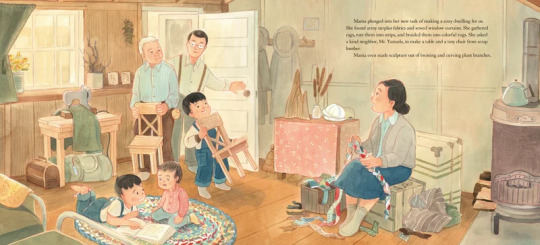
"You drew the home that my mother made out of that raw space, Takei tells Lee. "That was wonderful."
"'These themes of displacement and uprooting of communities from one place to another — these are things that are constantly happening,' says Lee. 'Because of war and because of political decisions ... those themes aren't uncommon. They're universal.'"
Full story with audio button (so you can listen to Takei and Lee talk about the project!) produced by Samantha Balaban. Includes link to order the book.
Happy birthday Mr. Takei.
#george takei#george takei's birthday!#michelle lee#books#human rights#japanese-american incarceration WWII
9 notes
·
View notes
Text
haven’t read mha in so long (bc i could tell that this was going to be the ending) but it’s really disappointing to see that a story that could have been about rehabilitation, acceptance, forgiveness, the effects of capitalism and the justice system (and the need for child labor laws) just…didn’t.
#ofc the manga is japanese and set in japan but from the leaks i’ve read this whole thing sounds like an allegory for american imperialism#or even how we deal with incarcerated ppl and ppl with drug additions#to summarize: as long as i’m a ‘good guy’ so as long as EYE think i tried it means it’s ok!!#mha spoilers
6 notes
·
View notes
Text










The United States government incarcerated over 13,000 people of Japanese ancestry at the Minidoka War Relocation Center. Construction began on the site on June 5, 1942, by the Idaho-based Morrison-Knudsen Company.
#US government#incarcerated#japanese-american history#Japanese ancestry#Minidoka National Historic Site#Minidoka Internment National Monument#USA#5 June 1942#anniversary#US history#Minidoka War Relocation Center#original photography#summer 2017#high desert#tourist attraction#barrack#baseball field#root cellar#travel#vacation#landmark#architecture#landscape#countryside#Idaho
6 notes
·
View notes
Text
"Canada entered the war with little military preparation, and with no external intelligence capacity. British intelligence provided the sole source of intelligence to Canada. Internally, defending Canada throughout the war meant assigning a considerable number of troops, including conscripts, to guarding bridges, ports, dams, and the like.
Guarding from what? Possible enemy attacks, but there were none other than a few penetrations of German submarines into the St. Lawrence, and one harmless, Japanese flurry near Esquimault, B.C.
Guarding installations from sabotage? Yes, but in spite of the considerable discourse this possibility engendered in the early years of the war, in fact, there were never any incidents of sabotage throughout the war on Canada’s soil or waters, or in its airspace. Canada was safe, far away from theatres of war.
In fact, the obsession with protecting internal installations had mostly propaganda value, for the real aim behind the announced defence of Canada was protecting Canada’s social order from labour agitators, as they were called, particularly those of the communist persuasion. This was a continuation of state policy from World War I and the inter-war period. In spite of the obvious peril presented by the significant fascist and pro-Nazi element in Canada, the RCMP was fixated on the Red Peril, a fixation which led to the internment of the communists and sympathizers.
Moreover, the Canadian state expended enormous energy jailing people in Canada during World War II. There were 34,000 German, Italian, and enemy, civilian prisoners-of-war held in Canada, including prisoners that the British had taken but asked Canada to guard, given Canadian distance from the theatres of war. Britain had sent another 5,400 plus enemy civilians to Canada to be detained, including many of whom were Jewish or leftist refugees from rightist states in Europe. Then, there were the enemy alien internees within Canada: 847 Germans, 632 Italians, and 782 Japanese, beyond the 22,000 plus Japanese evacuees from B.C..
At the same time, in spite of the considerable quantity of home-grown fascists in Canada, only 27 followers of Adrien Arcand, and Camillien Houde, the Conservative mayor of Montreal associated with Italian fascists, were interned while there were many more fascists floating about Canada unimpeded. Even getting the RCMP to move vis-à-vis the rightists operating in Canada required sustained effort from high-ranking public servants.
When the RCMP did move against German and Italian operators, it did so with overkill, interning mostly innocent Germans, Italians and Japanese. Writing about the internment of the Italians, one writer says that the Canadian state behaved during World War II like a police state, rather than one governed by laws. The Canadian state took to heart literally the words in the national anthem about standing on guard.
Nevertheless, government policy makers made much of the idea that most Germans and Italians in Canada were quite innocent. For one thing, they were generally not on the left of the political spectrum. Furthermore, there were 600,000 Germans in Canada, and they had political clout. German-Canadians were mostly assimilated and/or naturalized, while few were recent immigrants with direct knowledge of Hitler’s regime. There were about 3,000 members in three pro-Nazi organizations: the Nationalist Socialist Workers Party, the Deutsche Arbeitsfront, and the Deutscher Bund. Among the 110,000 Italians in Canada, most were considered to have joined fascist organizations for social purposes, and were judged to present no political or security risks.
Of course, this was not the estimate held of the Japanese. If the policy towards Germans and Italians was perceived internally as liberal, the hundreds of pointless arrests of these people leave one wondering what would have been an ílliberal policy. Would it have led to mass evacuations as it did in the case of the Japanese, against whom government planners displayed flagrant paranoia and racism?"
- Michael Martin, The Red Patch: Political Imprisonment in Hull, Quebec during World War 2. Self-published, 2007. p. 62-64
#mackenzie king government#anti-communism#iron heel#internment camps#internees#communist party of canada#communists#canada during world war 2#crime and punishment in canada#history of crime and punishment in canada#japanese canadian internment#japanese canadians#german canadians#mass incarceration#nikkei kanadajin#dictatorship within democracy#defence of canada regulations#racism in canada#war hysteria#academic quote#reading 2023#canadian history#the red patch
2 notes
·
View notes
Video
Manzanar Cemetery Monument by Mark Stevens Via Flickr: While taking in views of the landscape present in the Manzanar National Historic Site with a view looking to the southwest. This is of the Manzanar Cemetery and monument with a mountain backdrop of Mount Williamson.
#Alabama Hills#Alabama Hills National Scenic Area#Azimuth 246#Blue Skies#California and Oregon Road Trip#Concentration Camp#Day 2#Desert#Desert Landscape#Desert Mountain Landscape#Desert Plant Life#DxO PhotoLab 5 Edited#Hillsides#Internment Camp#Japanese American Incarceration#Japanese Internment Camp#Landscape#Landscape - Scenery#Looking SW#Manzanar#Manzanar Cemetery#Manzanar Cemetery Monument#Manzanar National Historic Site#Monument#Monument at Manzanar Cemetery#Mount Whitney Group#Mount Williamson#Mountain Peak#Mountains#Mountains in Distance
2 notes
·
View notes
Text
james suzuki I could fix you*
*like. I could write an interesting story that doesn't kill him off for a cheap plot device in a mediocre story line
#COWARDDSSSSSSSSSSSSS Blast From The Past is so fucking stupid but the fate of James Suzuki has pissed me off#to the point where the failed potential of this character lives in my head rent free. for over a decade#especially because you would absolutely have the US government trying to tap into him as an asset and now we're getting into the#Uncle Sam Wants YOU To Prove That You're A Loyal Dog! politics of loyalty esp wrt to the history of japanese incarceration#during WWII and the people who rejected the call to Play Nice For Uncle Sam#esp. since part of No Time To Die's whole shtick is some kind of naval gazing about imperial legacy as the era changes#like you're telling me that a mixed race japanese character whose father was a british spy and moved to america with his mother#doesn't hit literally ALL of those points. like i dont expect to get any of that out of Flemming. but my god. benson. im coming for#youuuuuuuuuuuuuuuuuu. salt in your shoes for A THOUSAND YEARS
0 notes
Text
Food in the Japanese-American Internment Camps of World War 2
youtube
0 notes
Text
youtube
0 notes
Text
hm i think that we kinda glossed over internment camps in school and that's pretty criminal actually
#i feel like the holocaust was hammered into our heads (which is a good thing! learning about that is a good thing!)#and then we kinda spend like one lesson on the mass incarceration of japanese americans based on xenophobia commited by our own country#and uh.#hm I wonder what the reason for that is#rue rants
1 note
·
View note
Text
Scholastic Books to Maggie Tokuda-Hall – Delete Racism References…
Another Wow…!! Silencing authors… Another company attempting to. Again… Is this really how we want to continue presenting America to the world…? A country of racists who want to continue down the path of belittling other races? Putting the ‘less desirables’ behind the curtain and to keep quiet…??? Publisher Scholasatic Books asked Maggie Tokuda-Hall to remove all of the Racism references…
View On WordPress
#incarceration camp#internment camps#Japanese-American#Love in the Library#Maggie Tokuda-Hall#publisher#Rosa Parks#Scholasatic Books#Studies Weekly#wwii
1 note
·
View note
Photo



On August 10, 1988, the Civil Liberties Act of 1988 was passed into law, apologizing and making reparations for the incarceration of Japanese Americans during WWII.
Record Group 11: General Records of the United States Government
Series: Enrolled Acts and Resolutions of Congress
File Unit: Laws of the United States; Public Law 100-383: An Act to Implement Recommendations of the Commission on Wartime Relocation and Internment of Civilians
Transcription:
Public Law 100-383
H.R. 442
One Hundredth Congress of the United States of America
At the Second Session
Begun and held at the City of Washington on Monday, the twenty-fifth day of January,
one thousand nine hundred and eighty eight.
An Act
To implement recommendations of the Commission on Wartime Relocation and Internment of Civilians
Be it enacted by the Senate and House of Representatives of the United States of America in Congress assembled.
Section 1. Purposes.
The purposes of this Act are to--
(1) acknowledge the fundamental injustice of the evacuation, relocation , and internment of United States citizens and permanent resident aliens of Japanese ancestry during World War II;
(2) apologize on behalf of the people of the United States for the evacuation, relocation, and internment of such citizens and permanent resident aliens;
(3) provide for a public education fund to finance efforts to inform the public about the internment of such individuals so as to prevent the recurrence of any similar event;
(4) make restitution to those individuals of Japanese ancestry who were interned;
(5) make restitution to Aleut residents of the Pribilof Islands and the Aleutian Islands west of Unimak Island, in settlement of United States obligations in equality and at law, for--
(A) injustices suffered and unreasonable hardships endured while those Aleut residents were under United States control during World War II;
(B) personal property taken or destroyed by United States forces during World War II;
(C) community property, including community church property, taken or destroyed by United States forces during World War II; and
(D) traditional village lands on Attu Island not rehabilitated after World War II for Aleut occupation or other productive use;
(6) discourage the occurrence of similar injustices and violations of civil liberties in the future; and
(7) make more credible and sincere any declaration of concern by the United States over violations of human rights committed by other nations.
SEC.2. Statement of the Congress
(a) With regard to individuals of Japanese Ancestry.-- The Congress recognizes that, as described by the Commission on Wartime Relocation and Internment of Civilians, a grave injustice was done to both citizens and permanent resident aliens of Japanese ancestry by the evacuation, relocation, and internment of civilians during World War II. As the Commission documents, these actions were carried out without adequate security reasons and without any acts of espionage or sabotage documented by the Commission, and were motivated largely by racial prejudice, wartime hysteria, and a
[page 2]
H.R.442--2
failure of political leadership. The excluded individuals of Japanese ancestry suffered enormous damages, both material and intangible, and there were incalculable losses in education and job training, all of which resulted in significant human suffering for which appropriate compensation has not been made. For these fundamental violations of the basic civil liberties and constitutional rights of these individuals of Japanese ancestry, the Congress apologizes on behalf of the Nation.
(b) With respect to the Aleuts.--The Congress recognizes that, as described by the Commission on Wartime Relocation and Internment of Civilians, the Aleut civilian residents of the Pribilof Islands and the Aleutian Islands west of Unimak Island were relocated during World War II to temporary camps in isolated regions of southeast Alaska where they remained, under United States control and in the care of the United States, until long after any potential danger to their home villages had passed. The United States failed to provide reasonable care for the Aleuts, and this resulted in widespread illness, disease, and death among the residents of the camps; and the United States further failed to protect Aleut personal and community property while such property was in its possession or under its control. The United States has not compensated the Aleuts adequately for the conversion or destruction of personal property, and the conversion or destruction of community property caused by the United States military occupation of Aleut villages during World War II. There is no remedy for injustices suffered by the Aleuts during World War II except and Act of Congress providing appropriate compensation for those losses which are attributed to the conduct of United States forces and other officials and employees of the United States.
TITLE I--UNITED STATES CITIZENS OF JAPANESE ANCESTRY AND RESIDENT JAPANESE ALIENS
SEC 101.SHORT TITLE.
This title may be cited as the "Civil Liberties Act of 1988".
SEC 102. REMEDIES WITH RESPECT TO CRIMINAL CONVICTIONS
(a) Review of Convictions.-- The Attorney General is requested to review any case in which an individual living on the date of the enactment of this Act was, while a United States citizen or permanent resident alien of Japanese ancestry, convicted of a violation of--
(1) Executive Order Numbered 9066, dated February 19, 1942;
(2) the Act entitled "An Act to provide penalty for violation of restrictions or orders with respect to persons entering, remaining in, leaving, or committing any act in military areas or zones", approved March 21, 1942 (56 Stat. 173); or
(3) any other Executive order, Presidential proclamation, law of the United States, directive of the Armed Forces of the United States, or other action taken by or on behalf of the United States or its agents, representatives, officers, or employees, respecting the evacuation, relocation, or internment of individuals solely on the basis of Japanese ancestry;
[page 3]
H.R.442--14
estate of a parcel of land consisting of all land outside such village that is within 660 feet of any point on the boundary of such village. The conveyance may be made under the authority contained in section 14(h)(1) of the Alaska Native Claims Settlement Act (Public Law 92-203;43 U.S.C. 1613(h)(1)), except that after the enactment of this Act, no site on Attu Island, Alaska, other than such traditional Aleut village site and such parcel of land, may be conveyed to the Corporation under such section 12(h)(1).
(f) Authorization of Appropriations.-- There are authorized to be appropriated $15,000,000 to the Secretary to carry out this section.
SEC.208. COMPLIANCE WITH BUDGET ACT.
No authority under this title to enter into contracts or to make payments shall be effective in any fiscal year except to such extent and in such amounts as are provided in advance in appropriations Acts. In any fiscal year, the Secretary, with respect to--
(1) the Fund established under section 203,
(2) the trust established under section 205(b), and
(3) the provisions of section 206 and 207,
shall limit the total benefits conferred to an amount not in excess of the appropriations for such fiscal year. Any provision of this title which, directly or indirectly, authorizes the enactment of new budget authority shall be effective only for fiscal year 1989 and thereafter.
SEC.209.SEVERABILITY.
If any provision of this title, or the application of such provision to any person or circumstance, is held invalid, the remainder of this title and the application of such provision to other persons not similarly situated or to other circumstances shall not be affected by such invalidation.
TITLE III-TERRITORY OR PROPERTY CLAIMS AGAINST UNITED STATES
SEC.301. EXCLUSION OF CLAIMS
Notwithstanding any other provision of law or of this Act, nothing in this Act shall be construed as recognition of any claim of Mexico or any other country or any Indian tribe (except as expressly provided in this Act with respect to the Aleut tribe of Alaska) to any territory or other property of the United States, nor shall this act be construed as providing any basis for compensation in connection with any such claim.
[signature] Norman Mineta
Speaker of the House of Representatives.
Speaker pro tempore
[signature] Spark Matsunaga
["Vice President of the United States and" crossed out] Acting President of the Senate. Pro Tempore.
[stamped] APPROVED
AUG 10 1988
[signature] Ronald Reagan
#archivesgov#August 10#1988#1980s#Japanese American history#Japanese American incarceration#World War II#WWII#reparations#Ronald Reagan
41 notes
·
View notes
